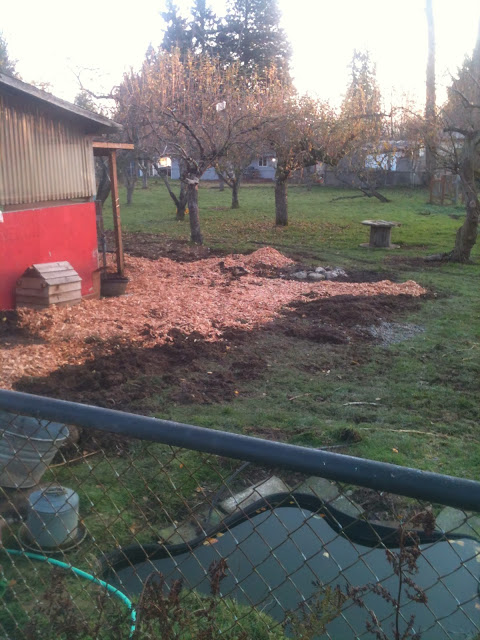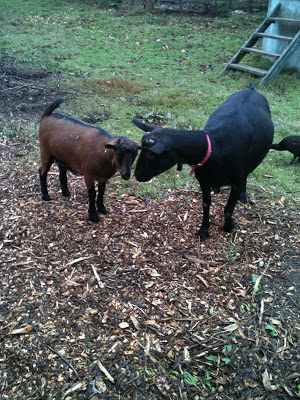But I couldn't' find Cosmo, our little rooster.
We got Cosmo about eleven years ago. Noah was a baby, and had a terrible stomach bug. I brought him back from the doctor and suddenly I knew I was sick too. We were sick all that day and all night. David got sick too.
The next morning I dragged myself out to feed the chickens, and saw that a dog had killed all but one of them.

We were of course very upset. We asked around but no one knew whose dog had done it.
But some kids were eager to help us get back up and running with chickens.
They gave us three hens and a little rooster.
My original plan to get rid of the rooster within twenty-four hours never panned out.
We kept him ever since.
When you talk to people about roosters there seem to be two main groups of rooster, the Fred Astaire variety and Jack the Ripper. Breed has nothing to do with it, this is a matter of style and manner.
At his best, a rooster is a huge asset to the farm. Roosters can be extremely brave. They walk up to people and animals. If they are raised to be trusting, they will walk up to people without fear but also without malice. They are often more cuddly than hens. When Noah was tiny - maybe three - he followed me out to the yard while I did chores.
When I turned around to check on him, he was holding Cosmo in his lap and slowly plucking his tail feathers out one by one. Cosmo sat so still and calm, I don't think Noah was even aware of hurting him. I had seen Noah with cats, chickens and dogs - all of which, though gentle, would bat him, peck, or at least try to escape. Nope, Cosmo just stayed put. I had to watch them together till Noah learned how to not walk around with him, because if he fell Cosmo wouldn't even try to jump to safety.

A good rooster is chivalrous to the hens. When he finds food, he coos and clucks for the hens.
Cosmo could spend several minutes strutting around with a worm in his beak, making trilling sounds to attract the chickens.
He would pretend to drop it and pick it up, pantomime eating without actually doing it.
Whatever he finds belongs to his flock.
Cosmo would find nesting spots for the hens. Here he is nesting in some hay, wriggling around to mold it into a nice, soft, solid feeling cavity where anyone might feel safe depositing her precious egg.
He would sit with the hens while they worked on their eggs. When they hopped out of the nest, he would cock-a-doodle to the rest of the flock so everyone could get back together.
Sometimes I would see him walking with one of the hens, stretching his tiny legs to keep up with them.

His goal in all of this, of course, is to obtain the hens favor and to help her raise eggs that carry his genes.
To do this, a rooster needs to court the hens. Cosmo would prance in circles around a hen, flashing his wings up and down and holding his head very high.
Some of the hens would crouch down and offer their charms to him. Others would walk away disdainfully. Cosmo always took that kind of snub well. Perhaps having so many hens, he always knew he could try someone else.
Of all the eggs he may have been involved in, only one ever hatched into a chick.
Laura - AKA Lauren - and later the Bantam Menace - was a rooster firmly grounded in the Dark Side of rooster manners.
He would run at Noah, claws out, and scratch his legs and hands. This was even though Noah had by that point learned to be gentle with animals, and anyway never got close enough to The Bantam to be a threat.
He pinned down hens and had his way with them. He was fine with goats unless they made sudden moves. Then he would flash out at them with his spurs and scratch them as if they were other roosters.
And his dad - he persecuted Cosmo day and night. He would chase him out of the barn, out to the fence line, and sometimes over the fence into the neighbor's yard or even the street. We don't have Lauren the Bantam Menace any more. He was my first experience with understanding how people become hardened to butchering their own meat animals.
Along with being good to hens and gentle with people, Cosmo had a fearlessness with anything in the form of a predator. When cats, or the one dog I saw him around, got into the yard he would always walk past them making a special call, half alarm, half shrill wail, and draw them away from the hens. He didn't usually stand his ground and fight them, more diverted them while the others got away.
When the hens went up to the roost, he would stay on the ground till the last lady got up.

But he had an uncommon talent for knowing which animals were safe. Like many birds, he liked to rest on top of goats. I think it keeps their feet warm.
Cosmo outlived a whole generation of goats, and two or three generations of hens. At nearly twelve, when he wan't on the perch this morning I assumed the worst. I looked in the treehouse where the Raccoon brought the duck it killed, but there were no scarlet feathers.
I checked the kidding shed where Jeannette used to hang out, but he wasn't there. I didn't see him on the hay bales in the garage, or in the tall grass by the fence line. After a while I gave up. I had to go to work, and I reasoned, if he is alive, he's ok. If he died, I can't help him. If anything hurt him at night, the cold will have already finished him off. I really can't do much to help him. I resolved to write his obituary if he didn't come home, and dedicate a blog story to him if he did.
When I got home, he was up on his roost. Old, but since roosters don't go grey, he will live however many days are left in all his fiery beauty and all his gentle good nature.
homestead-barn-hop-139; backyardfarmingconnection.com , frugal days sustainable ways , from-the-farm-blog-hop


















































